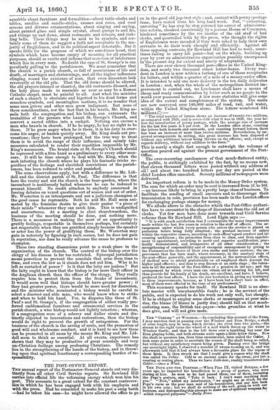111E POST-OFFICE REPORT.
THE annual report of the Postmaster-General stands out very dis- tinctly from all other Civil Service reports. Sir Rowland. Hill carries into official life the reforming energy which won him his post. This accounts to a great extent for the constant controver- sies in which he has been engaged both with his employes and with the press. Had he consented to make his post a snug berth —had he taken his ease—he might have allowed the office to go
on in the good old jog-trot style ; and, content with penny-postage fame, have rested from his long hard work. But, unhasting, unresting " he has step by step pursued his career of administra- tive reform, checked occasionally by a jealous House of Commons, hindered sometimes by the vie inertia) of the old staff of bad clerks, and quarrelled with by the press, who thought the rights of Englishmen were invaded. if they were asked to help their own servants to do their work cheaply and efficiently Against all these opposing currents, Sir Rowland Hill has had to work, some- times failing to carry his point—but on the whole, building up year by year an administrative organization possibly unsurpassed in the present day for extent and nicety of adaptation.
There are over eleven thousand post-offices iu the United King- dom, and nearly two thousand street letter-boxes. Every resi-
dent in London is now within a furlong of one of those receptacles for letters, and within. a quarter of a mile of a money-order office. It is intended to add. one more delivery to the ten daily deliveries in London ; and, when the whole of the metropolitan district im- provement is carried out, we Londoners shall have a means of cheap and ready communication by letter such as no people in the world ever possessed before. A few more statistics willgive some idea of the extent and completeness of the system. The mails are now conveyed. over 140,000 miles of road, rail, and water, within the United. Kingdom alone. The letters' numbered 544 millions (!) :-
" The total number of letters shows an increase of twenty-two millions, as compared with 1858, and is seven-fold what it was in 1839, the year be-
fore the introduction of penny postage, while the average rate of increase
for the last five years is 4 per cent. In the London office alone counting the letters both inwards and outwards, and counting forward teeters, there
has been an increase of more than twelve millions. Nevertheless, by im- proved arrangements in sorting, this great increase has been disposed of without any additional labour being thrown on the officers ; and, except as regards delivery, without any addition to the force."
This is surely a single fact enough to outweigh the volumes of assertion poured out against the present government of the Post- Office.
The ever-recurring carelessness of that much-flattered entity, the public, is strikingly exhibited by the fact, by no means new,
that eleven thousand letters were posted. without any address at all ! and about two hundred letters per day are posted at the chief London office unsealed. Seventy millions of newspapers were delivered.
An important reform is to be made in the Money Order system. The sum for which an order may be sent is increased from 5/. to 10/. —an increase likely to bring in a pretty large class of business. To facilitate the sending of small amounts and to discourage their transmission in coin, provision has been made in the Lond.oh offices for exchanging postage stamps for money. We allude above to the obstacles which the Post-Office authori- ties have to encounter in the shape of discontent from the old set of clerks. Yet few men have done more towards real Civil Service reforms than Sir Rowland Hill. Lord Elgin says :-
" It is with much satisfaction that I contemplate the many improvements made within the last few years in relation to the staff of officers. The ar-
rangement under which every person who enters the service is placed on probation before being fully admitted ; the gradual increase of salary within the respective classes, according to each officer's good conduct and in- creasing usefulness ; the promotion from class to class, and from appoint- ment to appointment, according to merit and superior qualification, prac- tically demonstrated, and irrespective of all other consideration ; the
strengthening of responsibility and of energetic management by giving. to
the Postmasters the choice of their own clerks and letter carriers; the im- provement that has been made, where necessary, in the sanitary state of the post-offices generally, and the appointment, at the metropolitan offices,
of medical men to attend gratuitously on all employed there (except the higher paid officers) ; and thus to stop disease at an early stage ; the exten- sion to all the servants of the Post-Office of a pension in old age; and the
arrangement by which every man can obtain aid in insuring his life, and thus provide for his family at his death, are excellent, and have, I believe, produced the best effects. I have the less hesitation in giving my testimony to these improvements, because, as I have been but a short time in office, most of them were effected in the time of my predecessors."
This summary speaks for itself. Sir Rowland Hill is no abso- lute master with unexhaustible funds ; he is the servant of the public, and is expected to do his work not only well, but cheaply. If he is obliged to employ some clerks or messengers at poor sala- ries, the blame (if blame is justly due) should fall on that much- enduring man, the British tax-payer—who grumbles at what he does give, and will not give more.


























 Previous page
Previous page